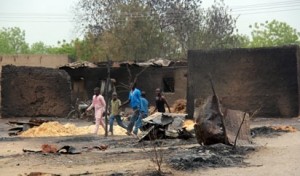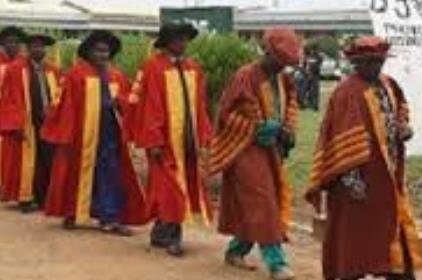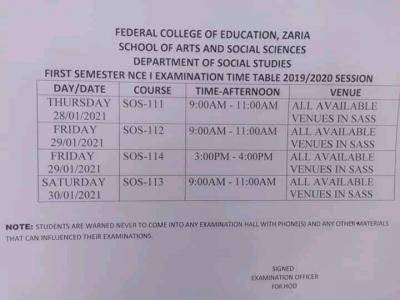
A spokesman for President Goodluck Jonathan have said that those behind the killing of students in Yobe state “will certainly go to hell.
Islamist extremists called Boko Haram massacred dozens of students in recent weeks in Yobe State, opening a new phase in their insurgency despite a nearly two-month-old military offensive against them.The latest attack early Saturday saw gunmen storm a secondary boarding school in the village of Mamudo, where they rounded up students and staff in a dormitory, threw explosives and opened fire, killing 42 people, almost all of them students.
Nigerians have grown accustomed to mayhem inflicted by Islamist extremist group Boko Haram — as well as the military’s heavy-handed response — but the gruesomeness of the school massacre drew widespread disgust.
A spokesman for President Goodluck Jonathan said those behind the attack “will certainly go to hell.” Military officials did not respond to requests for comment on Monday.
The school shooting marks the third such attack in three weeks.
The insurgents’ reasons for targeting students are unclear, though some observers say they may be seeking to generate as much attention as possible through shocking tactics.
Some have called for the government to take a smarter approach in efforts to end Boko Haram’s four-year insurgency, warning that military force will not solve the problem.
Jonathan declared a state of emergency in the northeast on May 14, saying Boko Haram had managed to take control of a number of remote border areas, and a sweeping military offensive followed.
Abubakar Tsav, a respected former police commissioner for the economic capital Lagos, said security forces should focus more on on-the-ground intelligence.
That should be accompanied by an honest attempt at dialogue, he said.
“In a situation like this, what should normally happen is government should be able to send plainclothes police and security men,” said Tsav.
“If you go in uniform with guns, you will never get information. Go and find out who these people are and who are their sponsors.”
Boko Haram’s insurgency has played out in various phases over the past four years, including assassinations of local leaders and security forces before moving on to more sophisticated attacks.
The insurgents have during certain periods focused on attacking churches with suicide or car bombings. They have also carried out suicide attacks on UN headquarters in the capital Abuja and on one of the country’s most prominent newspapers.
A rash of school attacks occurred in 2012, but they mostly involved insurgents burning school buildings at night and resulted in relatively few casualties. Boko Haram roughly translates to “Western education is a sin.”
But the most recent school attacks have specifically targeted students with deadly consequences.
On June 16, gunmen opened fire on a secondary school in Damaturu, the capital of Yobe state, killing seven students and two teachers. Two of the attackers were also killed, the army said.
A day later, extremists shot dead nine students as they sat an exam in a private school in Maiduguri.
Two of the three recent attacks occurred in Yobe state, prompting the state government to close all secondary schools until the new term in September.
Abubakar Siddique Mohammed, a professor and head of the Centre for Democratic Development, Research and Training based in the northern city of Zaria, feared the attacks would lead more children to drop out of school in the impoverished region.
He also called for honest dialogue to end the insurgency.
“Thousands of troops have been deployed to the northeast aided by jets and other military hardware, but still killings continue in a brazen manner, which has manifested in the killings of students in their hostels,” said Mohammed.
The military has claimed successes and say they have pushed the insurgents out. There seemed to be an initial drop in attacks after the offensive began, but there are now signs the gains were short-lived.
It is also impossible to independently verify the military’s account since it has cut mobile phone service in much of the region and access to remote areas is restricted.
Boko Haram itself remains nebulous. It has claimed to be seeking an Islamic state in Africa’s most populous nation, but it is also believed to include various factions with different aims.
The government has formed a panel to look at possibilities for offering amnesty to insurgents, but some have questioned the effort’s sincerity.
Tsav did not want to speculate on the government’s intentions, but felt greater efforts must be made to find those who may be willing to make peace.
“We are dealing with a very serious situation in the north,” he said.
“We have people who do not care about their lives… With a person with this type of thinking, no amount of shooting will deter them, so the best solution is dialogue.” AFP




